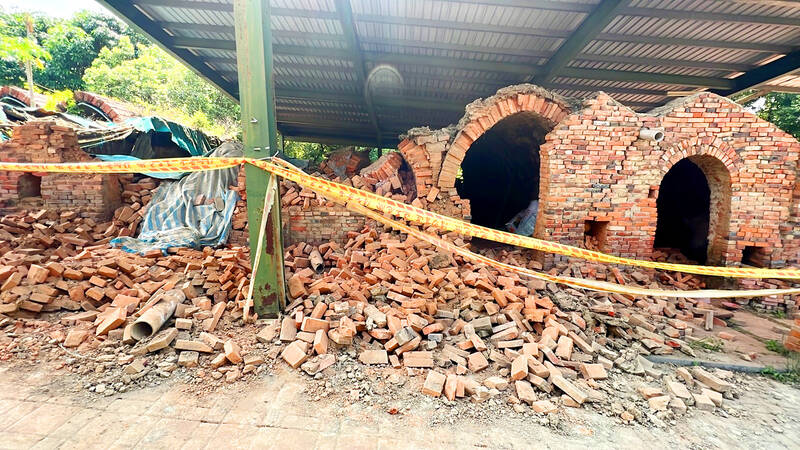Taitung County residents received national earthquake alerts on their mobile phones more frequently over the past year than people in other parts of Taiwan, Central Weather Bureau data showed.
Between Nov. 20 last year and Nov. 20, Taitung residents topped other administrative regions with 20 earthquake alerts. They were followed by Hualien County residents who received 17 alerts and Chiayi County residents who received 11, the bureau said.
Residents in Penghu, Kinmen and Lienchiang counties did not receive a single earthquake alert, it said.

Photo: CNA
The bureau shared the data on Facebook for the first time since the government connected the earthquake warning system to the cellphone broadcasting system in 2016, enabling people to receive earthquake alerts.
Several strong earthquakes occurred from Sept. 17 to Sept. 19, one of which was a magnitude 6.8 temblor at 2:44pm on Sept. 18 that was centered in Taitung’s Chihshang Township (池上), the bureau said.
Earthquakes happen frequently in Taiwan as it lies at the junction of two tectonic plates, the bureau said, adding that the national earthquake alert system was created to warn people to evacuate areas as soon as possible before shaking starts.
However, to prevent the public from being constantly bombarded by warning messages about small and medium-sized earthquakes, which generally do not lead to disasters, two conditions were set for the dissemination of messages: An earthquake must be estimated to be of magnitude 5 or greater or able to generate shaking intensity of 4 or greater, the bureau said.
Even if the magnitude of an earthquake is estimated to be greater than 5, warning messages are not sent out if the estimated intensity of the earthquake in a specific area does not reach 4, it said.
The system protects everyone, Central Weather Bureau Director-General Cheng Ming-dean (鄭明典) said.
“If there are too many alarms on your smartphones, it means you are facing risks; if there are too few alarms, it means you are in a relatively stable geological area,” he said.

A strong continental cold air mass is to bring pollutants to Taiwan from tomorrow, the Ministry of Environment said today, as it issued an “orange” air quality alert for most of the country. All of Taiwan except for Hualien and Taitung counties is to be under an “orange” air quality alert tomorrow, indicating air quality that is unhealthy for sensitive groups. In China, areas from Shandong to Shanghai have been enveloped in haze since Saturday, the ministry said in a news release. Yesterday, hourly concentrations of PM2.5 in these areas ranged from 65 to 160 micrograms per cubic meter (mg/m³), and pollutants were

Taiwan’s armed forces have established response protocols for a wide range of sudden contingencies, including the “Wan Chun Plan” to protect the head of state, the Ministry of Defense (MND) said today. After US President Donald Trump on Saturday launched a series of airstrikes in Venezuela and kidnapped Venezuelan President Nicolas Maduro, concerns have been raised as to whether China would launch a similar “decapitation strike” on Taiwan. The armed forces regularly coordinate with relevant agencies and practice drills to ensure preparedness for a wide range of scenarios, Vice Minister of National Defense Hsu Szu-chien (徐斯儉) told reporters before a

EVA Airways on Saturday said that it had suspended a pilot and opened an investigation after he allegedly lost his temper and punched the first officer several times as their plane was taxiing before takeoff at Los Angeles International Airport. According to a report published on Thursday by The Reporter, the incident occurred after the flight’s Malaysian first officer tried to warn the Taiwanese pilot, surnamed Wen (文), that he was taxiing faster than the speed limit of 30 knots (55.6kph). After alerting the pilot several times without response, the first officer manually applied the brakes in accordance with standard operating

Japanese Councilor Hei Seki (石平) on Wednesday said that he plans to visit Taiwan, saying that would “prove that Taiwan is an independent country and does not belong to China.” Seki, a member of the Japan Innovation Party, was born in Chengdu in China’s Sichuan Province and became a naturalized Japanese in 2007. He was elected to the House of Concilors last year. His views on the Chinese Communist Party (CCP) — espoused in a series of books on politics and history — prompted Beijing to sanction him, including barring Seki from traveling to China. Seki wrote on X that he intends